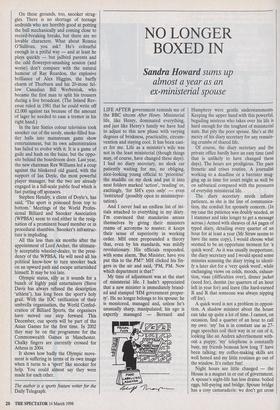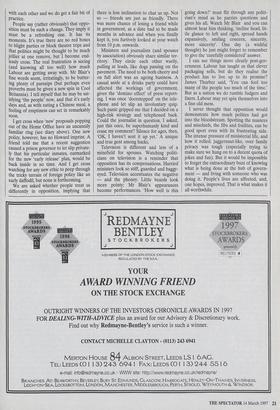NO LONGER BOXED IN
Sandra Howard sums up
almost a year as an ex-ministerial spouse
LIFE AFTER government reminds me of the BBC sitcom After Henry. Ministerial life, like Henry, dominated everything, and just like Henry's family we have had to adjust to this new phase with varying degrees of briskness, practicality, circum- vention and staying cool. It has been easi- er for me. Life as a minister's wife was not in the least ministerial (though things may, of course, have changed these days). I had no diary secretary, no sleek car patiently waiting for me, no obliging, nice-looking young official to 'prioritise' the muddle on my desk and put it into neat folders marked 'action', 'reading' or, excitingly, 'for SH's eyes only' — even `restricted' (possibly open to misinterpre- tation).
And I never had an endless list of ini- tials attached to everything in my diary. I'm convinced that mandarins amuse themselves by giving their ministers reams of acronyms to master; it keeps their sense of superiority in working order. MH once propounded a theory that, even by his standards, was mildly revolutionary. His officials responded, with some alarm, 'But Minister, have you put this to the PM?' MH clicked his fin- gers in the air and said, `PM, PM. Now which department is that?'
My time of adjustment was at the start of ministerial life. I hadn't appreciated that a new minister is immediately brand- ed and stamped `HM government proper- ty'. He no longer belongs to his spouse; he is monitored, managed and, unless he's unusually sharp, manipulated; his ego is expertly massaged — Bernard and Humphrey were gentle understatements. Keeping the upper hand with this powerful, beguiling mistress who takes over his life is hard enough for the toughest of ministerial nuts. But pity the poor spouse. She's at the mercy of his diary secretary for any remain- ing crumbs of shared life.
Of course, the diary secretary and the private office hardly have an easy time (and that is unlikely to have changed these days). The hours are prodigious. The pace frenetic and crises routine. A journalist working to a deadline or a barrister mug- ging up in time for court might as well be on sabbatical compared with the pressures of everyday ministerial life.
The diary secretary needs infinite patience, as she is the line of communica- tion, the conduit for spousely concern. (In my case the patience was doubly needed, as I stammer and take longer to get a message across.) Armed with sheaves of A4 pages of typed diary, detailing every quarter of an hour for at least a year (Mr Straw seems to have the same copy), I would choose what seemed to be an opportune moment for 'a quick word'. As it was usually inopportune, the diary secretary and I would spend some minutes scanning the diary trying to identi- fy a later slot for a 'very quick word', while exchanging views on colds, moods, exhaus- tion, visas (difficulties over), dinner jacket (need for), dentist (no quarters of an hour left in year for) and leave (the hard-earned R and R that someone was always nipping off for).
A quick word is not a problem in opposi- tion. A shadow minister about the house can take up quite a lot of time. I cannot, on occasion, find a quarter of an hour to call my own: 'my' fax is in constant use as 27- page speeches coil their way in or out of it, looking like an Andrex advertisement with- out a puppy; 'my' telephone is constantly busy, my friends bemoan how long T have been talking; my coffee-making skills are well honed and my little routines go out of the window. It's rather fun!
Night hours are little changed — the House is a magnet in or out of government. A spouse's night-life has less drama: boiled eggs, bill-paying and bridge. Spouse bridge has a cosy camaraderie: we don't get cross with each other and we do get a fair bit of practice.
People say (rather obviously) that oppo- sition must be such a change. They imply it must be a refreshing one. It has its moments. It's true there are no red boxes to blight parties or block theatre trips and that politics might be thought to be much jollier at one remove, but I become end- lessly cross. The real frustration is seeing (and knowing all too well) how much Labour are getting away with. Mr Blair's fine words seem, irritatingly, to be butter- ing plenty of parsnips (but perhaps even proverbs must be given a new spin in Cool Britannia). I tell myself that he may be sat- isfying 'the people' now, and that it's early days and, as with eating a Chinese meal, a feeling of emptiness can set in remarkably soon.
I get cross when 'new' proposals popping out of the Home Office have an uncannily familiar ring (see diary above). One new policy, however, has no Howard imprint. A friend told me that a recent suggestion caused a prison governor to let slip private- ly that his particular inmates, earmarked for the new 'early release' plan, would be back inside in no time. And I get cross watching for any new ethic to peep through the tricky terrain of foreign policy like an early daffodil, but none is forthcoming. We are asked whether people treat us differently in opposition, implying that there is less inclination to chat us up. Not so — friends are just as friendly. There was more chance of losing a friend while in government, as a date had to be made months in advance and when you finally kept it, you furtively looked at your watch from 10 p.m. onwards.
Ministers and journalists (and spouses by association) obviously share similar ter- ritory. They circle each other warily, pulling at leads, like dogs passing on the pavement. The need to be both cheery and on full alert was an ageing business. A casual aside at a drinks party could have affected the workings of government, given the 'domino effect' of press report- ing. I was once `doorstepped' on the tele- phone and let slip an involuntary quip. Such panic gripped me that I decided on a high-risk strategy and telephoned back. Could the journalist in question, I asked, just this once, be superhumanly kind and erase my comment? Silence for ages, then, `OK, I haven't sent it up yet.' A unique and true gent among hacks.
Television is different and less of a minefield for spouses. Watching politi- cians on television is a reminder that opposition has its compensations. Harried ministers look so stiff, guarded and baggy- eyed. Television accentuates the negative — and the phoney. Little beards look more pointy; Mr Blair's appearances become performances. 'How well is this going down?' must flit through any politi- cian's mind as he parries questions and gives his all. Watch Mr Blair and you can almost hear him thinking, 'incline head, lit- tle glance to left and right, spread hands expansively, smiling concern, sincerity, more sincerity'. One day (a wishful thought) he just might forget to remember to give the 'carefully considered' answer.
I can see things more clearly post-gov- ernment. Labour has taught us that clever packaging sells, but do they realise the product has to live up to its promise? James Thurber said, 'You can fool too many of the people too much of the time.' But as a nation we do rumble fudgers and fixers. Labour may yet spin themselves into a fine old mess.
I never thought that opposition would demonstrate how much politics had got into the bloodstream. Spotting the nuances and mischiefs, the fibs and frailties, can be good sport even with its frustrating side, The intense pressure of ministerial life, and how it rolled, juggernaut-like, over family privacy was tough (especially trying to make sure we hung on to a decent quota of jokes and fun). But it would be impossible to forget the extraordinary buzz of knowing what is being done at the hub of govern- ment — and living with someone who was doing it. People's lives are affected, and, one hopes, improved. That is what makes it all worthwhile.



































































 Previous page
Previous page